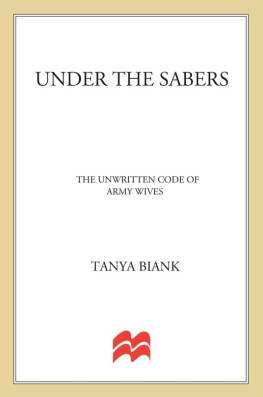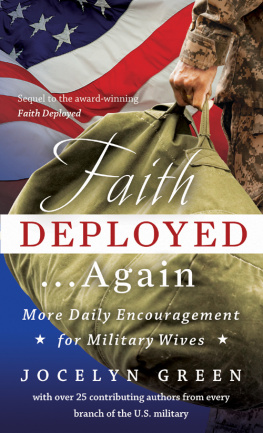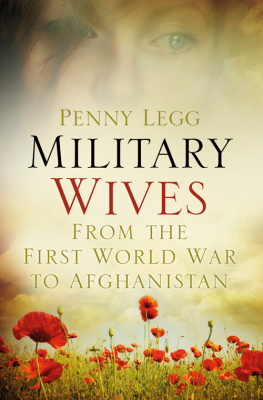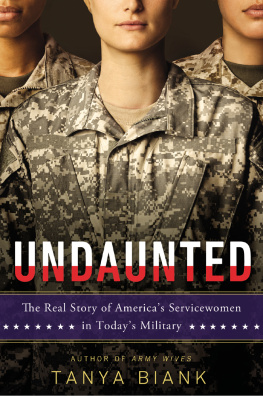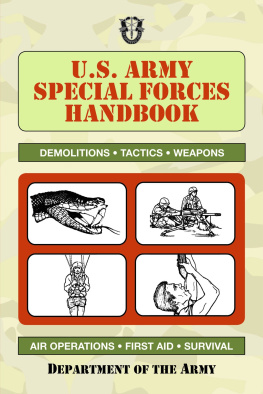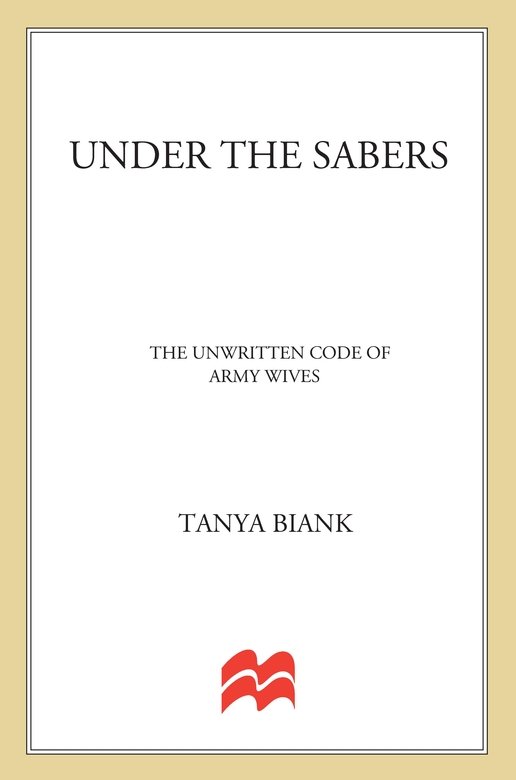A s a writer and Army brat it has been an honor, a privilegeand a great responsibilityto write this book. Telling the story of U.S. Army wives and the culture that surrounds them was something I didnt do lightly, and I hope Ive done this cloistered, unknown world justice.
I first want to thank the women who shared their stories. I learned much from each of them, and I appreciate their candidness, honesty, and their faith in me to neither distort nor sensationalize their lives. In the case of Andrea Floyd, I am grateful to her family and friends.
A special thank-you to my agent, Rafe Sagalyn, for introducing me to the world of book publishing and for encouraging me to think big. Thanks also to his assistant, Jennifer Graham, for her early encouragement.
I am grateful to Diane Reverand, my editor at St. Martins Press, who believed in and supported this project from the beginning. Her assistant, Regina Scarpa, also made this whole process a more pleasant one. My appreciation to the copyeditor, Sue Llewellyn, for her astute observations.
It has been an honor to work with Joan Tapper, my editor, confidante, and friend in Santa Barbara, California. Joan helped make my transition from newspapers to books enjoyable. Her editing and organizational skills are reflected throughout these pages.
Many thanks to Major Sam Pennica of the Cumberland County Sheriffs Department. His assistance and professionalism were truly valuable.
Among my friends I especially thank Patti Kogan, Harvey and Anne Oliver, and Dougald and Tori MacMillan for their love and support.
Special thanks to my husband, Michael, and my sister, Maria, who gave me love and encouragement from afar. Both were serving in Iraq while I was writing much of this book.
Finally, I thank my parents, Sam and Pat, whose forty-plus years of love for each other was the greatest gift to their children. Their lives confirm that love, commitment, and the Army can go together quite nicely.
D uring the summer of 2002 I wrote twenty-six storiesmany of them picked up by media far beyond Fayettevillecovering the Army wives deaths at Fort Bragg. It was important to me to look beyond the specific crimes, and throughout my coverage of the murders, I underlined the broader issues of how the militarys culture and perceptions and its stress and deployments affected Army marriages already in serious trouble. I also examined how the Army dealt with domestic violence by means of prevention and intervention. My reporting fostered discussion and debate, and the repercussions of the crimes echoed throughout the Army in many ways.
On September 30, 2002, five members of the House Armed Services Committee visited Fayetteville and Fort Bragg and promised to work for changes in the way the Department of Defense handled abuse in military families. Then, in November, the Pentagon released a forty-one-page report that found marital problems were a major factor in the murders, and that the stress from Fort Braggs high operational pace contributed to marital discord in marriages that were already experiencing problems. The report went on to say that the Armys behavioral health services were flawed, since they discouraged early identification and therapy for marital troubles while problems were potentially solvable. It emphasized that families needed earlier and more accessible therapy and counseling that did not jeopardize careers. The report said Lariam was not likely to have contributed to the killings.
Congress authorized $5 million for domestic violence programs in the military, and on December 2, 2002, President Bush signed into law an act that makes state domestic violence protective orders enforceable on military installations.
The murders of 2002 raised enough concern for the Army to take a hard look at itself. Among other things, the tragedies, coupled with the war on terrorism, prompted the military to redefine its attitudes about the crucial role wives and families play. With back-to-back deployments to Iraq, ongoing war in Afghanistan, and no end in sight, its none too soon. Military families are venturing into uncharted territory. Andrea Lynne is no longer alone in her young widowhood, scores of parents are burying sons Gary Shanes age who died in far-off places, and much as Rita did, wives are juggling jobs and kids while husbands are abroad.
Meanwhile strides have been made in providing care, counseling, and treatment for individuals and couples in need throughout the armed forces. Yet, in a culture that values not only physical but also emotional strength and stability, the stigma of reaching out for help will be difficult to remove.
Since three of the soldiers who killed their wives served in Afghanistan before the murders, the Army began having its soldiers deployed there fill out psychological-screening questionnaires before coming home. The fifty-five-point checklist, called a Pre-Redeployment Screening, asked about feelings of depression, anxiety, and hostility. Some soldiers nicknamed it the Dont Kill Your Wife Questionnaire and thought the whole thing was not only ineffective but also a joke. After all, who would put down something negative that would end up in his file? Others saw the questionnaire as nothing more than finger drilling (going through the motions), an attempt by the Army to show it was doing something. Nevertheless, if a soldier did use the questionnaire to cry out for help, he or she would receive counseling both before and after coming home. Commanders have also been encouraged to look for such symptoms of distress as depression and anxiety.
Fort Bragg has altered its domestic violence policies, held domestic violence workshops, leadership seminars, and candlelight vigils, and mailed brochures with family-help contact numbers to thousands ofArmy spouses. Many commanders on post now want to be immediately informed of domestic abuse involving soldiers in their units.
Although Armywide redeployment and reunion briefings have long been mandatory for soldiers and also offered to spouses, they have generally been taken more seriously since the murders. Depending on the unit and the attitude of those involved, these briefings can be meaningful or just a check-the-box exercise. The talks emphasize examining expectations and putting yourself in your spouses shoes. The men are told not to assume everything will be just as it was when they left home. After all, their kids have grown, and their wives, who have had to be both mother and father, might not want to relinquish their newfound independence. Husbands have to realize they are coming back to a family unit that has adjusted to life without them, and now has to adjust once again.
The women are counseled about expectations, too. They hear that their husbands may not welcome candlelit dinners at home or big nights out. Instead they might be withdrawn and want to sleep day and night. The men may be emotionally and physically exhausted and may not want to talk about their experiences. Wives are told not to take it personally and advised to keep things low-key for a while. In the past the recommendation was to maintain the status quo, which some leaders took to an extreme, admonishing wives not to cut their hair or rearrange the family-room furniture. More recent briefings take into account that life does move on during a six-month or yearlong deployment. As for sex, thats covered, too, with husbands and wives urged to communicate with each other before jumping in the sack.
Most Army units today in Iraq and Afghanistan have also incorporated a transitional week or two of light duty when soldiers return and before they take their standard two weeks of leave. Going to classes and physical training, and cleaning and inventorying weapons, help maintain routine and counteract the reverse culture shock of coming home.

